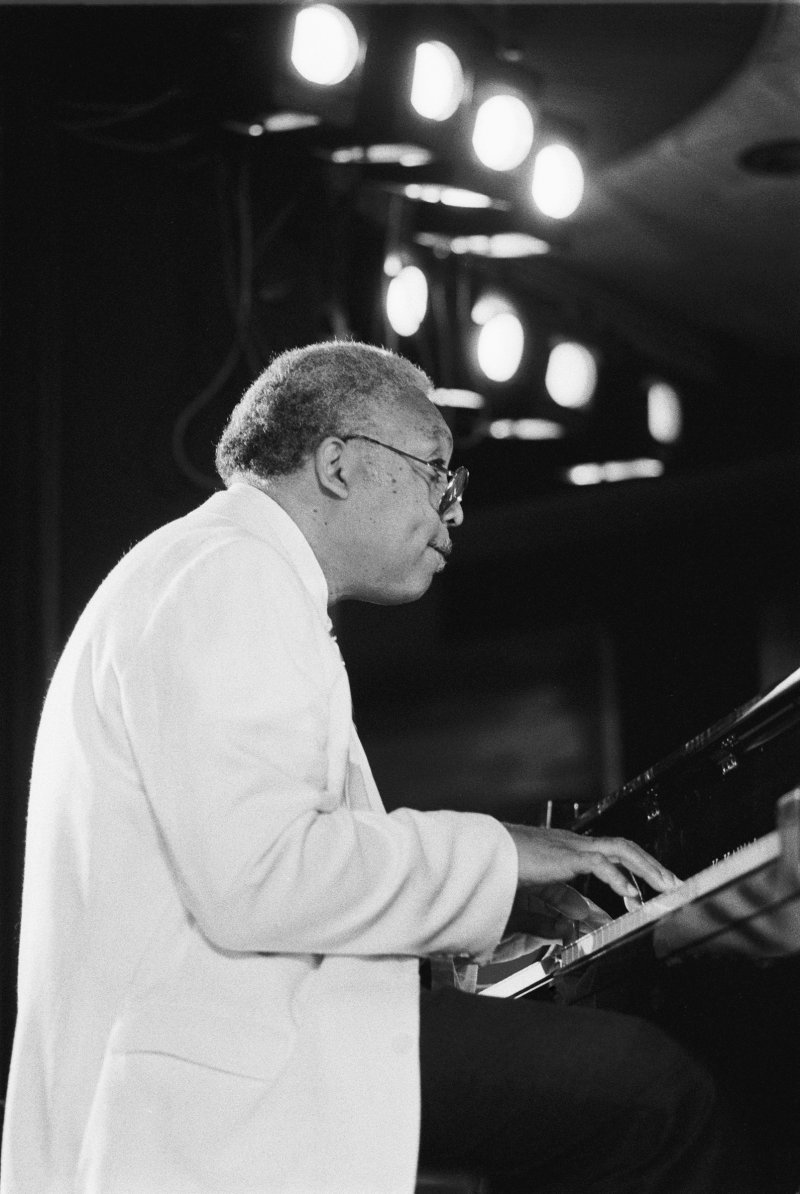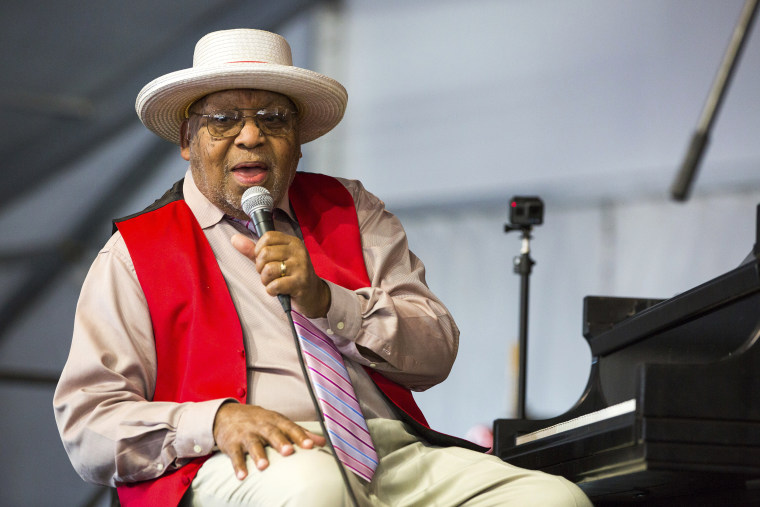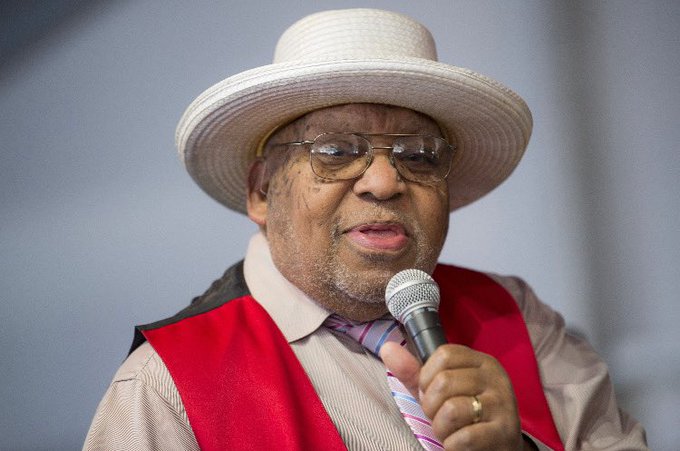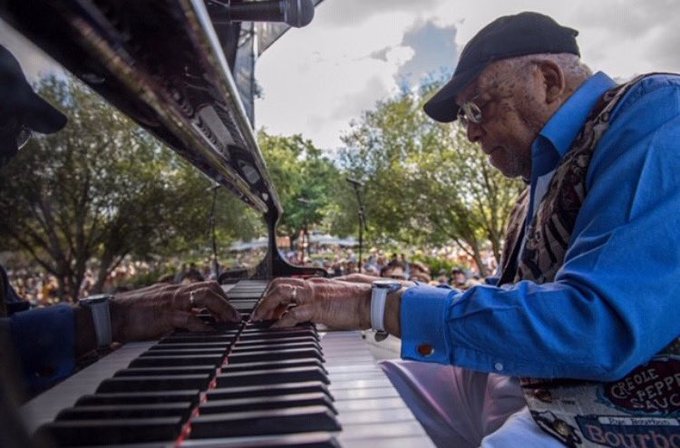Mr. Marsalis was a leading jazz pianist in New Orleans for decades, but he did not gain widespread renown until his sons reached prominence as they helped lead a jazz revival in the 1980s.
Wynton, a trumpeter who became an outspoken advocate for a return to the early traditions of jazz, has won nine Grammy Awards, is the co-founder of Jazz at Lincoln Center in New York and is probably the best-known jazz musician in the world. Branford, the winner of three Grammys, toured with Sting, led the “Tonight Show” band and is one of the leading saxophonists of his generation.
 Mr. Marsalis at the Kennedy Center in 2009. (Bill O'Leary/The Washington Post)
Mr. Marsalis at the Kennedy Center in 2009. (Bill O'Leary/The Washington Post)Two other Marsalis sons, trombonist Delfeayo and percussionist Jason, also became musicians, making them unquestionably the American first family of jazz.
“All I did was make sure they had the best so they could be the best,” Ellis Marsalis told Ebony magazine in 1993. “They did the rest.”
He spent virtually all his life in New Orleans, the city considered the cradle of jazz and the birthplace of such seminal musical figures as Jelly Roll Morton and Louis Armstrong. Even though he often struggled to make a living from music, Mr. Marsalis was seen as an enduring beacon of musical integrity who insisted on high standards for his students, his children and, above all, himself.
“He made us see life in a certain way,” Branford Marsalis said in a 1990 appearance on “Mister Rogers’ Neighborhood.” “We have a certain outlook on how we’re supposed to carry ourselves in the world and how we should see other people and treat other people that I think really has a profound effect on what we play musically.”
Mr. Marsalis found a new musical niche in his 40s, when he taught at the New Orleans Center for Creative Arts, a high school whose students included his sons, trumpeters Terence Blanchard and Nicholas Payton and singer-pianist Harry Connick Jr.
During the late 1980s, Mr. Marsalis taught at Virginia Commonwealth University in Richmond before returning to his hometown to lead the jazz studies program at the University of New Orleans.
“I never thought of myself as a teacher,” he once told NPR. “I used to always look at myself as being a coach. Not devoid of instruction, but I was never that organized in my approach to what I was doing.”
Through it all, Mr. Marsalis remained a working musician, appearing with jazz players passing through New Orleans and, from 1967 to 1970, touring with popular trumpeter Al Hirt. Yet he was a relatively obscure regional figure until his sons’ success brought him into the spotlight.
“My dad’s philosophy is, ‘Jazz isn’t popular. Let’s play jazz,’ ” Branford Marsalis told Jazz Times magazine in 2019. “When Wynton and I were playing in R&B bands, doing cover tunes, we were making way more money than he was. Wynton was like, ‘Doesn’t that bother you?’ ‘No, I chose this,’ [he said]. That was the end of it.”
Beginning in the 1980s, Mr. Marsalis’s rising profile led to recording contracts and occasional appearances with his sons, including with Branford on “Loved Ones,” a 1996 album containing 14 songs with women’s names in the title — including “Dear Dolores,” which Mr. Marsalis wrote for his wife.
His 1990 recording with Wynton, “The Resolution of Romance,” containing more than 20 ballads, was a portrait of musical sensitivity and a high point for both musicians.
“I heard my father playing these songs in clubs so beautifully,” Wynton said in the liner notes accompanying the album. “What I love about his style is that he’s got a serious touch and he’s always listening and always trying to make everybody in the band sound better, which is the best way to play. . . . The feeling in his playing comes through as just what it is: deep interest and concern for things human and musical.”
After retiring from teaching in 2001, Mr. Marsalis devoted more time to performing, including regular appearances at the Snug Harbor jazz club in New Orleans. He often accompanied his four musical sons, and the Marsalis family collectively received the Jazz Masters honor from the National Endowment for the Arts in 2011.
“It’s nice to be known as a performer, but this publicity came 30 years too late,” he told his son Jason for the liner notes of their 1998 recording, “Twelve’s It.” “At this point I just want to pass information on to as many of you guys as possible.”
Ellis Louis Marsalis Jr. was born Nov. 14, 1934 in New Orleans. His parents ran a motel where many leading African American entertainers and civil rights figures stayed.
Mr. Marsalis played saxophone in his youth and did not become a full-time pianist until he was a student at New Orleans’s Dillard University, from which he graduated in 1955. He then served as a musician in the Marine Corps, appearing regularly on television while stationed in California.
He was familiar with traditional New Orleans jazz, but he much preferred the complexities of bebop and more modern styles. He ran a nightclub at his family’s motel in the 1960s, but it soon failed. He began teaching in earnest in 1974, influencing generations of New Orleans musicians. He later received a master’s degree in musical education from Loyola University in New Orleans.
He helped instill a respect for quality and musical integrity that his sons later made their musical hallmark. He used a nutritional analogy to make his point:
“I used to tell students that it reminded me of a dessert I bought at the store once,” he told Southern Living in 1992. “I looked on the box and there were no natural ingredients in it at all. . . . [In jazz] we were still playing instruments like the saxophone, which you have to breathe into to get sounds. And the drums, which you have to strike, and the piano, which is made out of wood. There was human control over them.”
In 1958, Mr. Marsalis was married to Dolores Ferdinand, who “commanded discipline in a house where Dad was often on the road,” Branford Marsalis told The Washington Post in 2009. She died in 2017.
In addition to Branford, Wynton, Delfeayo and Jason Marsalis, survivors include two other sons, Ellis Marsalis III, a poet and photographer, and Mboya Marsalis, who is autistic and lived with his father; a sister; and 13 grandchildren.
Mr. Marsalis and his sons last performed together as a family at the New Orleans Jazz and Heritage Festival in 2019. He gave his final performance in December at Snug Harbor. A community musical education facility was named in his honor after Hurricane Katrina devastated New Orleans in 2005.
Even though he played the piano professionally, Mr. Marsalis maintained a proficiency on other instruments, including the bass and saxophone.
“I remember being in the bathroom one day and hearing a horn playing Charlie Parker” licks on the saxophone, Wynton Marsalis told DownBeat magazine in 2011. “I said, ‘Damn, Branford finally learned how to play that thing?’ I came into the living room, and it was Daddy.”










 : Chris Granger/New Orleans Advocate
: Chris Granger/New Orleans Advocate



